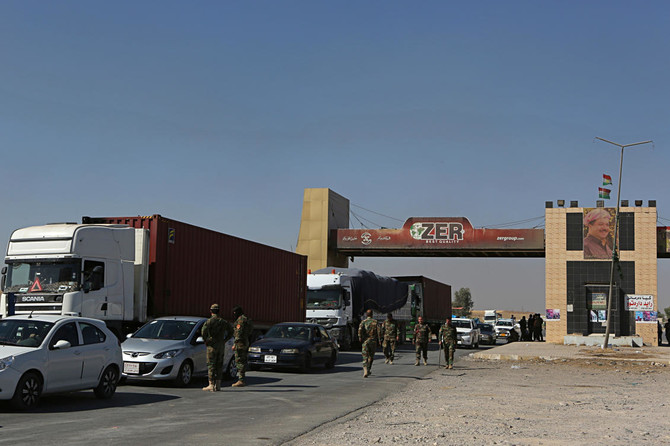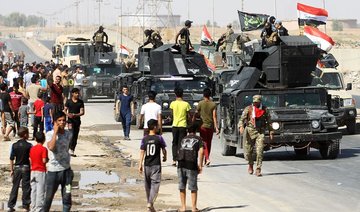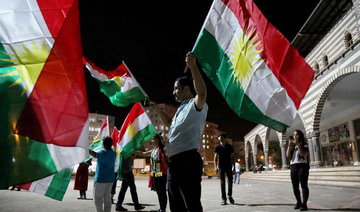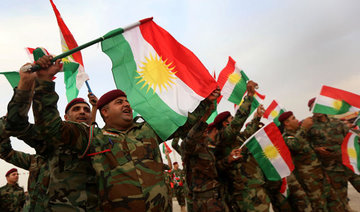ANKARA: Four Turkish soldiers were killed in northern Iraq in two separate attacks blamed on Kurdish militants, the Turkish military said on Tuesday.
Five other soldiers were injured when two improvised explosive devices exploded on Monday in the Zap region of northern Iraq, not far from Turkey’s southeastern border.
The army blamed a “separatist terrorist organization” — Turkey’s official term for the outlawed Kurdistan Workers’ Party (PKK) — for the blasts.
Clashes broke out immediately after the first of the attacks, the military said, as it reported it had killed 16 PKK members in air strikes in the past 24 hours.
It was not possible to independently verify the toll.
Since the PKK launched its insurgency in Turkey in 1984, over 40,000 people have been killed. The group is blacklisted as a terrorist organization by Ankara, the United States and the European Union.
After the collapse of a two-year cease-fire in 2015, Turkish military operations against the PKK intensified in southeastern Turkey.
Turkey regularly conducts air raids against PKK militants who have rear bases in the Qandil mountain area of Iraq, while Turkish ground troops sometimes stage incursions into the area.
The incident comes at a time of high tensions in Iraq following the controversial non-binding independence vote held by Iraqi Kurdistan last month, which was bitterly opposed by Turkey and Baghdad.
The blasts took place outside areas held by the Iraqi Kurdistan Regional Government.
Four Turkish soldiers killed in northern Iraq: army
Four Turkish soldiers killed in northern Iraq: army

Houthis say alleged US airstrike that hit Yemen prison holding African migrants kills 68

The strike was in Yemen’s Saada governorate, a stronghold for the Houthis.
It will likely renew questions from activists about the American campaign, known as “Operation Rough Rider,” which has been targeting the militia as the Trump administration negotiates with their main benefactor, Iran, over Tehran’s rapidly advancing nuclear program.
The US military’s Central Command, in a statement early Monday before news of the alleged strike broke, sought to defend its policy of offering no specific details of its extensive airstrike campaign. The strikes have drawn controversy in America over Defense Secretary Pete Hegseth’s use of the unclassified Signal messaging app to post sensitive details about the attacks.
“To preserve operational security, we have intentionally limited disclosing details of our ongoing or future operations,” Central Command said. “We are very deliberate in our operational approach, but will not reveal specifics about what we’ve done or what we will do.”
It did not immediately respond to questions from The Associated Press about the alleged strike in Saada.
Graphic footage shows aftermath of explosion
Graphic footage aired by the Houthis’ Al-Masirah satellite news channel showed what appeared to be dead bodies and others wounded at the site. The Houthi-run Interior Ministry said some 115 migrants had been detained at the site.
The militia’s Civil Defense organization said at least 68 people had been killed and 47 others wounded in the attack.
Footage from the site analyzed by the AP suggested some kind of explosion took place there, with its cement walls seemingly peppered by debris fragments and the wounds suffered by those there.
A voice, soft in the footage, can be heard repeating the start of a prayer in Arabic: “In the name of God.” An occasional gunshot rang out as medics sought to help those wounded.
The International Organization for Migration, a United Nations agency, said it was “deeply saddened” by the deaths at the prison.
“It is imperative that all efforts are made to avoid harm to civilians and to protect those most vulnerable in these challenging circumstances,” it said.
US military says over 800 strikes conducted in campaign so far
Meanwhile, US airstrikes overnight targeting Yemen’s capital killed at least eight people, the Houthis said. The American military acknowledged carrying out over 800 individual strikes in their monthlong campaign.
The overnight statement from Central Command also said “Operation Rough Rider” had “killed hundreds of Houthi fighters and numerous Houthi leaders,” including those associated with its missile and drone program. It did not identify any of those officials.
“We will continue to ratchet up the pressure until the objective is met, which remains the restoration of freedom of navigation and American deterrence in the region,” it added.
The US is targeting the Houthis because of the group’s attacks on shipping in the Red Sea, a crucial global trade route, and on Israel. The Houthis are also the last militant group in Iran’s self-described “Axis of Resistance” that is capable of regularly attacking Israel.
US discusses deadly port strike
The US is conducting strikes on Yemen from its two aircraft carriers in the region — the USS Harry S. Truman in the Red Sea and the USS Carl Vinson in the Arabian Sea.
On April 18, an American strike on the Ras Isa fuel port killed at least 74 people and wounded 171 others in the deadliest-known attack of the American campaign. Central Command on Monday offered an explanation for why it hit the port.
“US strikes destroyed the ability of Ras Isa Port to accept fuel, which will begin to impact Houthi ability to not only conduct operations, but also to generate millions of dollars in revenue for their terror activities,” it said.
Meanwhile, the Houthis have increasingly sought to control the flow of information from the territory they hold to the outside world. It issued a notice Sunday that all those holding Starlink satellite Internet receivers should “quickly hand over” the devices to authorities.
“A field campaign will be implemented in coordination with the security authorities to arrest anyone who sells, trades, uses, operates, installs or possesses these prohibited terminals,” the Houthis warned.
Starlink terminals have been crucial for Ukraine in fighting Russia’s full-scale invasion and receivers also have been smuggled into Iran amid unrest there.
Sisi meets Burhan in Cairo to discuss restoring stability in Sudan

- 2 leaders also planned to consult on strengthening bilateral ties
DUBAI: Egyptian President Abdel Fattah El-Sisi and Sudan’s Transitional Sovereign Council President Gen. Abdel Fattah Al-Burhan met in Cairo on Monday to discuss ways to restore stability and promote development in Sudan.
The two leaders also planned to consult on strengthening bilateral ties and addressing various regional issues, Ahram Online reported.
Al-Burhan’s visit comes amid ongoing conflict in Sudan, where fighting between the Sudanese army and the Rapid Support Forces has devastated the country.
Al-Burhan declared Khartoum “free” of RSF control in March after a major military push.
The war, which erupted in April 2023 over disputes regarding the RSF’s integration into the military, has left tens of thousands dead, with both sides accused of committing atrocities.
Sudan remains deeply divided, with the army controlling the north and east, while the RSF holds much of Darfur and parts of the south.
Iraq’s counter-terrorism chief discusses security with Egyptian, Jordanian envoys

- The meetings focused on strengthening cooperation, exchanging expertise and sharing perspectives on security issues
DUBAI: The head of Iraq’s Counter-Terrorism Service, Lt. Gen. Karim Al-Tamimi, held separate meetings on Monday with the Egyptian and Jordanian military envoys to discuss ways to boost security cooperation.
Al-Tamimi met with Egyptian military attache Col. Akram Sharif and Jordanian military attache Brig. Gen. Anwar Al-Bashbasha, according to a statement from the Counter-Terrorism Service.
The meetings focused on strengthening cooperation, exchanging expertise and sharing perspectives on security issues between the three countries.
Jordanian armed forces foil two major narcotics smuggling attempts

- Border Guard Forces, in coordination with military security and the Anti-Narcotics Department, monitored a group of smugglers trying to illegally cross into Jordan
DUBAI: Jordan’s Eastern and Southern Military Zones thwarted separate drug smuggling attempts over the past two days, as the Jordanian Armed Forces-Arab Army intensified efforts to protect national security.
On Monday, the Eastern Military Zone carried out a special operation, stopping an infiltration attempt from Syrian territory.
An official military source said Border Guard Forces, in coordination with military security and the Anti-Narcotics Department, monitored a group of smugglers trying to illegally cross into Jordan.
Rapid reaction patrols were sent out, applying the rules of engagement, which resulted in injuries among the smugglers and the retreat of others back into Syria.
A subsequent search uncovered large quantities of narcotics, which were transferred to the relevant authorities.
On Sunday evening, meanwhile, the Southern Military Zone foiled an attempt to smuggle narcotics using a drone along its western front.
The drone was tracked, intercepted and brought down inside Jordanian territory, with the seized drugs handed over to the relevant agencies.
‘New inferno was unleashed’ with restart of Gaza war, says ICRC director

- Gaza is experiencing and enduring death, injury, and multiple displacements, the ICRC says
DOHA: A “new inferno” has been unleashed on Gaza following the restart of war in the Palestinian territory, the director general of the International Committee of the Red Cross (ICRC) said Monday.
“Gaza is experiencing and enduring... death, injury, multiple displacements, amputations, separation, disappearance, starvation and denial of aid and dignity on a massive scale, and just when the all important ceasefire led people to believe they had survived the worst, a new inferno was unleashed,” Pierre Krahenbuhl told a Doha conference on security.




















